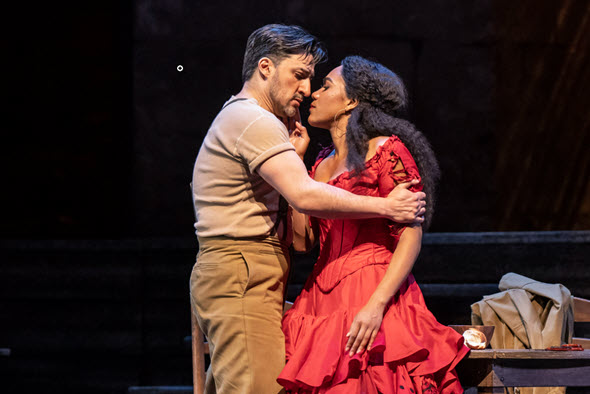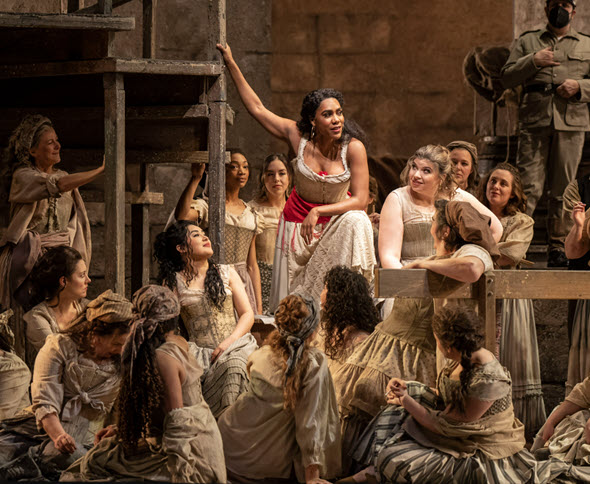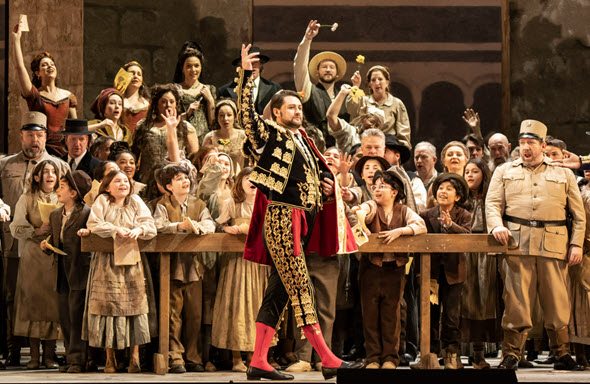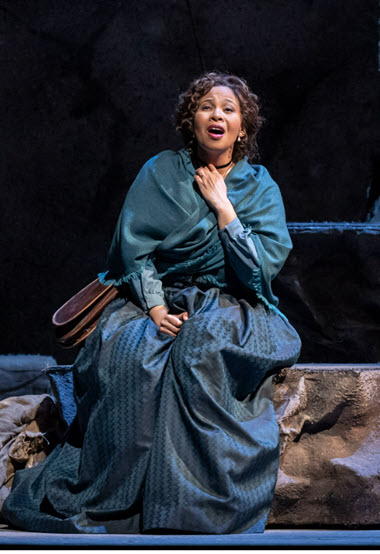‘Carmen’ at Lyric Opera: Love and death in old Seville, ups and downs in a muddled retelling

As love heats up, tensions rise between Carmen (J’Nai Bridges) and Don Jose (Charles Castronovo). (Todd Rosenberg photos)
Review: “Carmen” by Georges Bizet, at Lyric Opera of Chicago through April 7. ★★
By Lawrence B. Johnson
Two warring concepts shape and drive Bizet’s opera “Carmen” – love and death. Or in French, l’amour and la mort, the one word formed as if entirely by the lips, the other resonating from somewhere deep in the back of the throat. Love, in the earthy and precarious world of the gypsy Carmen, is transitory, a placeholder, an article as disposable as life itself. But death, this thing that wells up from so deep a place in speech, is profound and inevitable, the single eternal verity. Both musically and dramatically, Lyric Opera of Chicago’s busy and vibrant “Carmen” wants the depth and darkness that mark this work as the prototype of verismo opera.
The problems are multifarious, and most of them lie at the production’s core. Director Marie Lambert-Le Bihan’s big scenes look more calculated and contrived than spontaneous; and when the story moves in on moments of great passion and urgency, the direction often feels tentative. Conductor Henrik Nánási appears to have ceded control of the music-drama to the director. At critical points where the musical line should articulate the drama, tempos that feel either hurried or slack confuse the picture. Nor is mezzo-soprano J’Nai Bridges the Carmen to salvage this scattered enterprise. Her gypsy is a lovely coquette with a bright voice to match – where ferocity, raw sensuality and a more voluptuous sound are needed.
What borders on great here is tenor Charles Castronovo’s portrayal, in voice and bearing alike, of the good soldier Don José, a guileless country boy from Navarra who is out of his element in Seville, homesick, vulnerable and easy prey for the demonic Carmen. Castronovo’s grievous and gorgeous delivery of “La fleur que tu m’avais jetée,” José’s desperate offering of proof to Carmen that he truly loves her, was an authentic show-stopper.
But the breath-stopper, also served up by Castronovo, came in the final confrontation between Carmen and José in the empty plaza outside the bull ring where the crowd has assembled to cheer the celebrated toreador Escamillo – Carmen’s newest lover. Having lost his honor, his girl back home, everything, José makes one final appeal to Carmen to start anew with him; but the more he pleads, the more pathetic, even repugnant, he becomes in her eyes. Musically, it is arguably the finest episode in the opera, and it is riveting theater. It is also José’s scene, a lengthy cri de coeur that falls impotent on Carmen’s deaf ears and defiant heart. Castronovo infused José’s crazed supplication with towering agony.
Yet what should be a knife’s edge of contention between this lost soul and the utterly uncaring object of his passion was dulled by a sort of meandering interaction between the two. Knife’s edge, indeed. It isn’t easy to throw away the moment of Carmen’s death on the blade of José’s knife. It’s one of the truly electric instants in all of opera. But in this case, José was out of position to stab her as she moved toward the arena gate. He attacked her from an awkward angle. The scene died before Carmen did. And when José cried out, “You can arrest me, I killed her,” no one had emerged from the stadium to hear him.
That is not the director’s only bizarre choice, or perhaps I should say it bookends another, in Act 1. After José’s demure girl Micaëla (soprano Golda Schultz) has ventured into the city to find him at his military post and deliver his mother’s special gift, a tiny kiss on the cheek, she leaves. It’s a long trek home. She’s gone. Except in this director’s imagination, Micaela, an innocent and unsuspecting lass, creeps back in the shadows to observe José’s first fateful dalliance with Carmen. Does Micaela have some reason to come back? No. Does her spying explain or alter a later plot development? No. It’s no more than a fatuous distraction.
Schultz is a charming and vocally winning Micaëla. In what has come to be known as “Micaela’s aria,” sung as the girl searches for José in a mountain pass at night, Schultz delivered an exquisitely contoured and expressive appeal for God’s protection. That scene also brought baritone Andrei Kymach’s Escamillo into full, lusty voice after a not quite secure effort in the so-called “Toreador Song” at Lillas Pastia’s tavern in the previous act.
I can’t help wondering if the scene at Lillas Pastia’s would have fared better if conductor Nánási had been shaping it rather than the stage director. In another of the absurdities of this production, we find Bridges’ almost-gypsy Carmen carefully tugging castanets onto her fingers and then, through her dance to amuse José, not clicking them even once. Similarly, in the earlier carousing, dancers executed almost-flamenco choreography that was perhaps, to be generous, nouveau.
The Lillas Pastia scene did splendidly showcase the immense talent percolating in Lyric’s Ryan Center professional training program. Carmen and her fellow free spirits Frasquita (soprano Denis Velez), Mercédès (mezzo-soprano Katherine DeYoung), Remendado (tenor Ryan Capozzo) and Dancaïre (baritone Laureano Quant) – all four current Ryan Center fellows – made vivacious work of the quintet in which they plot their next nefarious moves.
The confrontation at Lillas Pastia’s between José and his commander, Zuniga, which is really a face-down over Carmen’s favors, also confirmed the rich voice and confident stage presence of yet another Ryan Center internist, bass William Clay Thompson, who was likewise assured in the opening act’s uproar involving Carmen and the other cigarette girls.

Frasquita (Denis Velez, left) and Mercedes (Katherine DeYoung, left) warn Carmen (J’Nai Bridges) that Don Jose is lurking nearby.
It is in the pivotal third act, the brigands’ mountain encampment, that the clash between love and death comes into high profile, through readings of tarot cards. While Carmen’s female pals construe love and opportunity, Carmen sees in each turned card only death. The motif is further played out in the vitriolic argument that ensues between Carmen and Jose, she declaring them finished and he adamant that he will never give her up. It was Bridges’ most heated and compelling singing of the night.
The Lyric Opera Orchestra gave a flavorful account of Bizet’s splendorous and beloved score, and the Lyric Chorus – the men as soldiers, the women as workers from the cigarette factory – sang with infectious vitality. In the role of the urchins who march about singing and imitating the soldiers at the changing of the guard, the Uniting Voices Chicago kids were irresistible.
Finally, I must succumb to an unusual need to comment on the program notes, specifically the plot summary, which doggedly refers to Carmen and her associated thieves and cutthroats, these common lawless brigands, as revolutionaries. Prosper Mérimée, who wrote the novel on which Bizet’s opera is based, would be quite amazed to find his lowlifes so ennobled. Carmen as a political flag-waver, a gypsy Joan of Arc. That’s funny.




